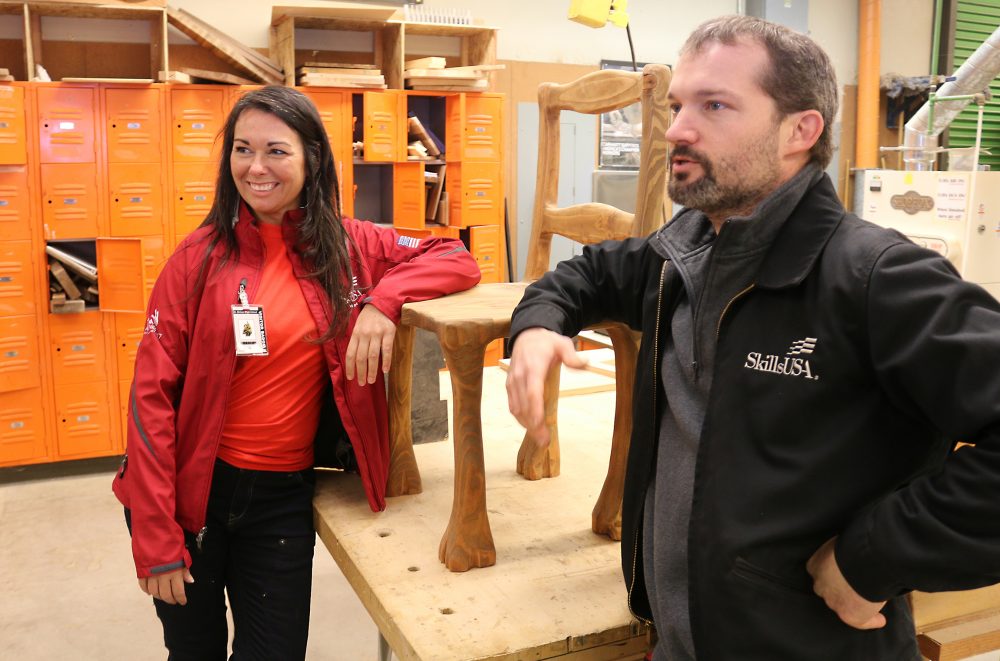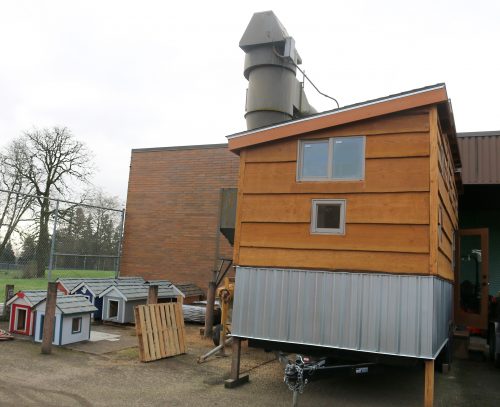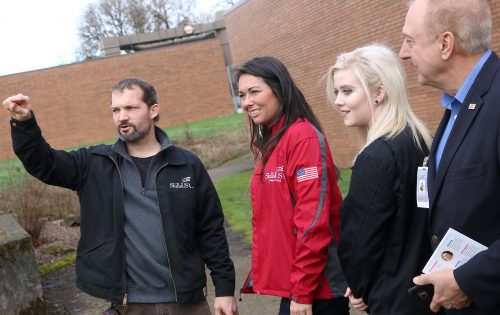This content was published: February 26, 2018. Phone numbers, email addresses, and other information may have changed.
PCC, St. Helen’s dual credit partnership bathes in the national limelight
Photos and story by James Hill

St. Helens High School teacher and PCC dual credit instructor Joe Mauck led the tour with TV Host Kayleen McCabe.
A partner of Portland Community College’s successful Dual Credit Program earned national acclaim and a visit from a television celebrity.
In honor of national SkillsUSA Week and CTE Month (Feb. 4-10), host Kayleen McCabe of DIY Network’s “Rescue Renovation” stopped by St. Helens High School to tour its innovative career and technical education (CTE) programs. After encouraging the students to think about careers in the trades during a special apprenticeship forum in the school’s auditorium, McCabe toured the dual credit CTE programs that St. Helens has with PCC – Automotive Service Technology, Building Construction Technology, Computer Aided Design, Drafting Technology, Hospitality and Tourism, Early Childhood Education, Office Systems, Engineering, Natural Resources and Manufacturing.
McCabe wanted to show that starting early in a career in the trades can set the students up for a great career.
“The reason I’ve been successful is because I’ve worked very, very hard in the trades,” she told the students. “Once you work in the trades you have this common bond with others and understand how things are built. SkillsUSA is an organization that I wished I had the opportunity to join when I was in high school because for somebody who loves construction so much and the trades, it would have been really great to hang out with other friends that were interested in it, too.”
PCC is on the forefront of providing the opportunity for high school students to earn college credit while still in high school through CTE classes hosted right at their school. Students who complete courses taught at their high school by qualified instructors, who provide the same rigor and content as an on-campus college class, can earn PCC credit in Lower Division Collegiate and Career & Technical Education courses.
“We have had this association for many years,” said Brad Fox, BCT instructor at the Rock Creek Campus, of his program’s connection with St. Helens. “Students here at the school and the Rock Creek Campus have the opportunity to get credits toward our program or to whatever they are pursuing. It’s been a great relationship.”

St. Helens students built this tiny house thanks to the college’s Building Construction Technology classes.
Fox said the teachers he works with serve on his program’s industry advisory committee that shapes curriculum. With a gap in the number of qualified, skilled workers for industry to hire, he said these partnerships are critical in boosting the regional workforce.
“We found with some of recent grads, if they stay in the program and graduate, there is a pretty good market out there for people to find work,” Fox said. “We’re hoping, as students come into the program, they learn the skills they need for that next step of their career.”
McCabe didn’t hold back her enthusiasm for the employment outlook.
“There are great jobs out there,” she said. “The opportunities are out there for them to start and have a great job and make great money early on.”
Currently there are 62 high schools articulating PCC Dual Credit. In 2016-17, the PCC Dual Credit Program registered 6,759 students who earned 42,432 credits. As a student of the PCC Dual Credit program, students were not charged tuition or fees. This was a savings to the students and their families of $4,073,472 in PCC tuition and generated approximately 1,274 college FTE.
At St. Helens, PCC partners with trades teachers like Joe Mauck. His group runs ten CTE programs, offering classes throughout the school. It’s an important bridge to in-demand jobs where industry is attempting to fill a worker shortage for fields that are well-paying. For a plumber, his or her 2017 wage was nearly $40 an hour and an elevator constructor earned more than $52. Most area wages for various trades and CTE fields earned between $25 to $52 an hour last year.

At St. Helens, PCC partners with trades teachers like Joe Mauck. His group runs 10 CTE programs, offering classes throughout the school.
Having the SkillsUSA delegation and McCabe, along with PCC representatives Beth Molenkamp (PCC’s PACTEC manager) and Chris Holden (PCC’s Oregon Manufacturing Innovation Center training director), emphasize these points with students was a big deal.
“It was very encouraging to have them come visit with our students,” said Mauck. “It was good affirmation to the students that learning a trade will be valuable whether they go on to college before a career or not. I also appreciated how many representatives from PCC showed up to validate our program and encourage the students on their choices. For many of my students that are not quite ready to make the step into the workforce, having a community college option to teach them the skills to be more qualified is an incredible opportunity.”
Mauck added that St. Helens High School is a solid, long-term partner, with PCC providing the training students need to succeed.
“Because we are dual credit articulated with PCC, students already have an advantage and can graduate sooner, having had the duplicate college course in high school,” Mauck added.
During her state of the state address to the Oregon Legislature earlier this winter, Gov. Kate Brown made hands-on learning and CTE training like at St. Helens a priority for the Oregon’s students.
“I was raised to believe that if I worked hard, I could accomplish anything I set my mind to,” said Governor Brown. “My concern is that this doesn’t hold true for everyone in Oregon today. I strongly believe that hands-on learning experience, like career and technical education, is one of the best ways to get our students to cross the stage at graduation and walk into the world of work, filling Oregon’s jobs and growing Oregon’s economy.”
Dual Credit Snapshot
Portland Community College provides the opportunity for high school students to earn college credit while still in high school.
- The college has 62 participating high schools.
- Applying for dual credit at PCC is a three-step process.
Learn more about the college’s Dual Credit Program.


Good work at getting the word out. I have been building CTE classes and instructing trades and apprentices for over fourty years.